Contents
| |||||
| Decades: | |||||
|---|---|---|---|---|---|
| See also: | Other events of 2002 List of years in Georgia (country) | ||||
| |||||
| Decades: | |||||
|---|---|---|---|---|---|
| See also: | Other events of 2002 List of years in Georgia (country) | ||||

Eduard Ambrosis dze Shevardnadze was a Soviet and Georgian politician and diplomat who governed Georgia for several non-consecutive periods from 1972 until his resignation in 2003 and also served as the final Soviet Minister of Foreign Affairs from 1985 to 1990.

The Union of Citizens of Georgia was a political party established by Eduard Shevardnadze, Communist leader of the Georgian SSR from 1972 to 1985 and then President of Georgia from 1992 to 2003, and David Chantladze, former General Trade Representative of the Soviet Union to Czechoslovakia. Although Shevardnadze won the 1992 general election as an independent, in November 1993 he announced his plan to create his own party, which was established a few days later.
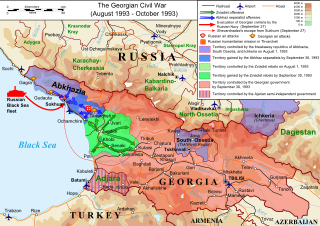
The Georgian Civil War lasted from 1991 to 1993 in the South Caucasian country of Georgia. It consisted of inter-ethnic and international conflicts in the regions of South Ossetia and Abkhazia, as well as the violent military coup d'état against the first democratically-elected President of Georgia, Zviad Gamsakhurdia, and his subsequent uprising in an attempt to regain power.
The Kodori Valley, also known as the Kodori Gorge, is a river valley in Abkhazia, Georgia's breakaway autonomous republic. The valley's upper part, populated by Svans, was the only corner of the post-1993 Abkhazia directly controlled by the central Georgian government, which since 2006 officially styles the area as Upper Abkhazia. On August 12, 2008, Russo–Abkhazian forces gained control of the Upper Kodori Valley, previously controlled by Georgia.

Tengiz Kitovani was a Georgian politician and military commander with high-profile involvement in the Georgian Civil War early in the 1990s when he commanded the National Guard of Georgia.

The Georgian–Ossetian conflict is an ethno-political conflict over Georgia's former autonomous region of South Ossetia, which evolved in 1989 and developed into a war. Despite a declared ceasefire and numerous peace efforts, the conflict remained unresolved. In August 2008, military tensions and clashes between Georgia and South Ossetian separatists erupted into the Russo-Georgian War. Since then, South Ossetia has been under a de-facto Russian control.
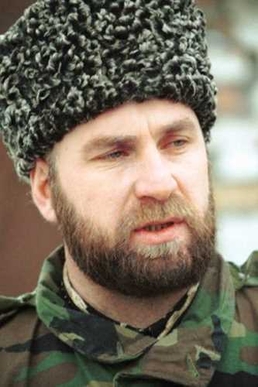
Ruslan (Khamzat) Germanovich Gelayev was a prominent commander in the Chechen resistance movement against Russia, in which he played a significant, yet controversial, military and political role in the 1990s and early 2000s. Gelayev was commonly viewed as an abrek and a well-respected, ruthless fighter. His operations spread well beyond the borders of Chechnya and even outside the Russian Federation and into Georgia. He was killed while leading a raid into the Russian Republic of Dagestan in 2004.

The 2006 Kodori crisis erupted in late July 2006 in Abkhazia's Kodori Gorge, when a local militia leader declared his opposition to the Government of Georgia, which sent police forces to disarm the rebels. The upper part of the Kodori Gorge was at that time the only portion of Abkhazia, Georgia's breakaway republic, not controlled by the Abkhaz authorities.

Emzar Kvitsiani is a former Georgian military commander and politician. He took part in the War in Abkhazia (1992–1993), forming a paramilitary group Monadire in the upper Kodori valley, guarding it from Abkhaz forces. He was mainly active in Kodori valley, which he ran de facto through his militia from 1992 to 2006. In 1999, President Eduard Shevardnadze appointed Kvitsiani to the post of President's special envoy to Kodori valley. In 2001, Kvitsiani allegedly cooperated with Chechen field commander Ruslan Gelayev in an attempt to bring Abkhazia back under Georgian control. Kvitsiani opposed the Rose Revolution, which subsequently led to confrontation with the Georgia's central authorities under Mikheil Saakashvili. President Sakaashvili removed him from his official government position in December 2004 and later disbanded the Monadire in April 2005. Kvitsiani declared defiance to the authorities in 2006 and was subsequently ousted by the Georgian government forces. He fled to North Caucasus, but, in 2014, he was arrested on his return to Georgia, initially sentenced to 16 years in jail, and then released under a plea bargain in early 2015. He was one of the leaders of the Alliance of Patriots of Georgia and a member of Parliament of Georgia.
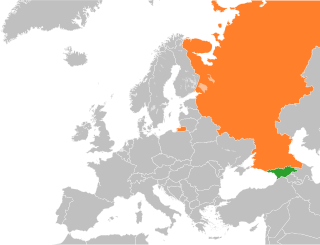
Contacts between Russia and Georgia date back to the 15th and 16th centuries, and the most important stage started in the 1580s, when the Georgian kingdom of Kakheti and the Russian Empire signed a treaty of alliance in 1587. Relations between the two countries developed vibrantly and culminated in the Treaty of Georgievsk, which established eastern Georgia as a protectorate of Russia. At that time, Georgia saw Russia as a powerful Christian and modernizing neighbor, capable of protecting Georgia from invading Muslim empires and North Caucasian raiders.
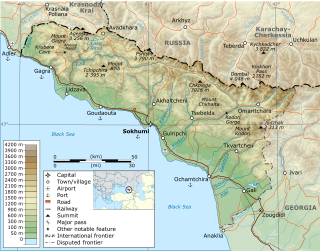
The War in Abkhazia was fought between Georgian government forces for the most part and Abkhaz separatist forces, Russian government armed forces and North Caucasian militants between 1992 and 1993. Ethnic Georgians who lived in Abkhazia fought largely on the side of Georgian government forces. Ethnic Armenians and Russians within Abkhazia's population largely supported the Abkhazians and many fought on their side. The separatists received support from thousands of North Caucasus and Cossack militants and from the Russian Federation forces stationed in and near Abkhazia.

The prelude to the Russo-Georgian War is the series of events, including diplomatic tensions, clashes, and skirmishes, that directly preceded the August 2008 war between Georgia and the Russian Federation. Though tensions had existed between the two countries for years and more intensively since the Rose Revolution, the diplomatic crisis increased significantly in the spring of 2008, namely after Western powers recognized the independence of Kosovo in February and following Georgian attempts to gain a NATO Membership Action Plan at the 2008 Bucharest Summit; and while the eventual war saw a full-scale invasion of Georgia by Russia, the clashes that led up to it were concentrated in the breakaway republics of Abkhazia and South Ossetia, two separatist Georgian regions that received considerable Russian support over the years.

This article describes the background of the Russo-Georgian War.
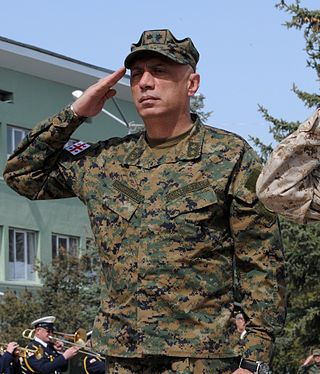
Devi Chankotadze is a Georgian military leader and politician who served as Georgia's Chief of the Joint Staff of the Armed Forces in 2008–2012, and has served as a member of the Parliament since 2020. He carries the rank of Lieutenant General.
The War in Abkhazia from 1992 to 1993 was waged chiefly between Georgian government forces on one side, Russian military forces on other side supporting separatist forces demanding independence of Abkhazia from Georgia. http://www.historyorb.com/russia/georgia.php Ethnic Georgians, who lived in Abkhazia fought largely on the side of Georgian government forces. Ethnic Armenians and Russians within Abkhazia's population, largely supported Abkhazians and many fought on their side. The separatists were supported by thousands of the North Caucasus and Cossack militants and by the Russian Federation forces stationed in and near Abkhazia.

The Pankisi Gorge crisis was a spillover of the Second Chechen War, with military dimension in Georgia early in the 2000s. Georgia was pressured by Russia and the United States to repress the threats of Al-Qaeda in the Pankisi Gorge.

The Lopota incident, known in Georgia as the special operation against an illegal armed group in Lopota, was an armed incident where the Georgian special forces engaged an unknown paramilitary group of about 17 unknown individuals which had allegedly taken several people hostage in the remote Caucasus gorge of Lopota near the border between Georgia and the Russia's Republic of Dagestan.
The following lists events in 2017 in Georgia.
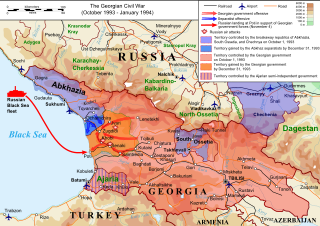
The Battle of Poti was a series of engagements around Poti, Georgia during the Georgian Civil War, between rebels supporting the ousted Georgian president Zviad Gamsakhurdia, the so-called 'Zviadists', and Russian forces supporting the Georgian Head of State Eduard Shevardnadze. A group of Russian Marines of the Black Sea Fleet landed in the Georgian port city in late October 1993 to protect an important railway between Poti and the Georgian capital Tbilisi. In November clashes between the Russians and the Zviadists erupted, with the Russian Major General Boris Djukov, claiming no Russian casualties. The fighting ended when the Georgian Armed Forces broke through the rebels' defenses and entered their capital Zugdidi on the 6th of November.